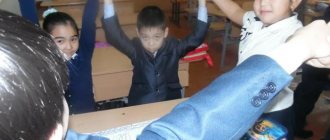Didactic game “Fold the flower”
Goal: to consolidate in children knowledge about the great rights of the child. Teach children to understand their abilities by following certain rules and rights. Promote a negative attitude towards manifestations of aggression, cruelty, and exploitation. Encourage the desire to be honest.
Material: red and green circles with images of children's faces, multi-colored petals on which are pasted images depicting the child's rights to a good life or their violation.
Rules of the game: players must place petals around a green circle, on which are pasted images representing the rights of a child to a decent life, and around the red circle place petals representing a violation of the rights of a child.
Game progress: Two or more children can participate in the game.
Option 1
2 circles (green and red) are placed on the table in the center, and the petals on the table are placed with the image on the table. Children take turns choosing a petal, examining it, and explaining whether the child’s rights are protected or violated. If the petal depicts an image of protecting the rights of a child, it is located around a green circle, and if the rights of a child are violated, then around a red circle. The game ends when both flowers are collected.
option 2.
Two children are playing. The child is asked to fold a flower, the petals of which depict images of protecting the rights of the child, and the second child - images of violations of the rights of the child. The player who composes the flower first wins.
Didactic game “Chain of rights of the child”
Goal: to strengthen children's knowledge about the rights of a small child. Improve your reading skills. Develop fine motor skills of your hands. Cultivate attention and visual perception.
Material: parts of the “chain”: some are a graphic representation of the rights of the child, others are a verbal explanation of the graphic images.
Rules of the game: to verbally explain the rights of the child, children choose pictures with graphic images, explaining their content, forming a chain. Vice versa.
Game progress:
Option 1
The provider or child reads a verbal explanation of the child's rights to parts of the chain. Children find suitable graphics, connect them with a cable and talk about the child’s right that is depicted on it.
What else to read: Word game Crocodile: game rules, board review or how to play
option 2:
Children choose for themselves parts with a graphic representation of the rights of the child and, with the help of the teacher, or independently find the appropriate verbal explanation. And they are connected with a cord. The one who connects the chain the fastest wins.
Didactic game “Let every child know that he has different rights”
Goal: to consolidate in children knowledge about the rights to love and care, rest and leisure, good nutrition, education and medical care.
Material: cube with photo illustrations on children's rights.
Rules of the game: Players must explain the rights of the child, which are shown in the picture.
Game progress: Children stand in a circle. At the teacher’s signal, the children begin to pass the cube into each other’s hands. When the signal sounds, the child receiving the cube looks at his picture and talks about the child's right side, which is depicted on it. The game continues until all the illustrations have been recycled.






